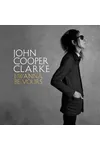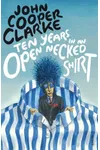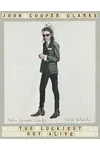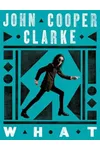Picture a wiry poet with wild hair and a razor-sharp tongue, spitting rhymes that blend punk rebellion with Salford grit—meet John Cooper Clarke! Born in 1949, this English performance poet, dubbed the 'punk poet,' exploded onto the 1970s scene with his rapid-fire delivery and biting social commentary. From sharing stages with the Sex Pistols to inspiring Arctic Monkeys, Clarke’s unique blend of humor, satire, and streetwise poetry has made him a cultural icon.
With a career spanning over five decades, Clarke’s work captures the absurdities of urban life, earning him a devoted following and a place in classrooms and concert halls alike. Ready to dive into the world of the Bard of Salford? Let’s explore his story!
The Making of John Cooper Clarke
Born on January 25, 1949, in Salford, Lancashire, John Cooper Clarke grew up in a working-class family surrounded by the industrial hum of northern England. His love for words sparked early, ignited by his English teacher John Malone, a literary adventurer Clarke described as an 'Ernest Hemingway type.' Inspired by poets like Pam Ayres and Sir Henry Newbolt, Clarke began crafting verses that married high art with street slang. By his late twenties, he was performing in Manchester’s punk clubs, his skinny frame and wild mane perfectly suited to the rebellious spirit of the era.
Clarke’s big break came through comedian Bernard Manning, who booked him to compère at a workingmen’s club. His witty, irreverent poems caught the punk wave, landing him gigs alongside bands like Joy Division and Buzzcocks. With his signature look—dark sunglasses, tight trousers, and a shock of hair—Clarke was ready to redefine poetry.
John Cooper Clarke’s Unforgettable Works
Clarke’s poetry is a high-octane mix of rhythm, rhyme, and raw honesty, often delivered a cappella in a nasal Northern drawl. His breakthrough album, Snap, Crackle & Bop (1980), featured classics like 'Evidently Chickentown,' a profanity-laced rant about urban decay later immortalized in The Sopranos. Its vivid imagery and relentless rhythm captured the grit of 1970s Britain.
Another gem, 'I Wanna Be Yours,' is a tender yet quirky love poem that Arctic Monkeys adapted for their 2013 album AM. Its playful metaphors—like wanting to be a lover’s vacuum cleaner—showcase Clarke’s knack for blending romance with absurdity. His 1983 collection Ten Years in an Open Necked Shirt became a bestseller, while 2020’s The Luckiest Guy Alive proved his wit remains razor-sharp, with poems like 'I Wrote the Songs' lampooning modern life.
Clarke’s style is unmistakably his own: fast-paced, alliterative, and packed with dark humor. He tackles themes like social inequality, urban squalor, and human folly, using colloquial language to make poetry accessible. His work feels like a punk gig in a smoky pub—raw, real, and electrifying.
Why John Cooper Clarke Matters
John Cooper Clarke didn’t just write poetry; he revolutionized it. By bringing verse to punk venues and collaborating with musicians like The Invisible Girls, he made poetry cool for audiences who’d never cracked open a book of sonnets. His influence spans generations, from inspiring Plan B’s Ill Manors to earning a place on the UK school curriculum. In 2013, the University of Salford awarded him an honorary doctorate for bringing poetry to non-traditional audiences.
Despite a harrowing battle with heroin addiction in the 1980s, Clarke’s comeback—marked by his 2020 memoir I Wanna Be Yours and sold-out tours—shows his enduring relevance. His ability to blend humor with hard truths keeps him a vital voice in a world craving authenticity.
About John Cooper Clarke
- Born: January 25, 1949, Salford, England
- Key Works: Snap, Crackle & Bop, Ten Years in an Open Necked Shirt, I Wanna Be Yours, The Luckiest Guy Alive
- Awards: Honorary Doctorate of Arts, University of Salford (2013)
- Fun Fact: He once shared a flat with Velvet Underground’s Nico!
Snag I Wanna Be Yours or catch a live show to experience John Cooper Clarke’s punk-poetry magic. Trust us, his words will stick with you like a catchy riff!



